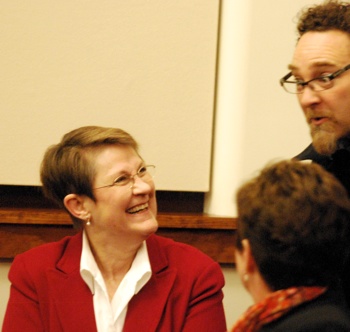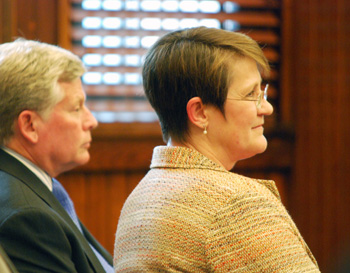County Board Handles Budget, Policy Items
Washtenaw County board of commissioners meeting (March 19, 2014): Budget and finance issues were the focus of several items at the March 19 meeting, including a report that the county saw a $3.92 million surplus for its general fund in 2013. The county’s fiscal year is the same as the calendar year. Total general fund revenues were $105.797 million, with total expenses of $101.876 million.

Pat Kelly, former Dexter Township supervisor, talks with county commissioner Conan Smith and finance director Kelly Belknap before the March 19, 2014 county board meeting. The board passed a resolution of appreciation for Pat Kelly during the meeting. (Photos by the writer.)
The board also heard from county treasurer Catherine McClary, who reported that foreclosures are decreasing, as are delinquent taxes. Delinquent taxes are a leading economic indicator for both mortgage foreclosures and tax foreclosures, she noted, so the decreases are good news. Commissioners gave initial authorization to the treasurer’s office to borrow up to $30 million against the amount of delinquent property taxes in all of the county’s 80 taxing jurisdictions, an annual process.
Commissioners also authorized the county administrator to hire a contract employee who will support budget-related work this year for the county board and administration. The vote came over dissent from Rolland Sizemore Jr., who felt the work could be absorbed by existing staff.
The budget was also the focus of an update from lobbyist Kirk Profit and his colleague Gary Owen at Lansing-based Governmental Consultant Services Inc., who talked about how action in the state government might impact Washtenaw County. GCSI is the lobbyist for the county and several other local governments, including the city of Ann Arbor. Their updates included the fact that legislation has been introduced to repeal Act 88, which the county uses to levy taxes for economic development and agriculture. This year, the county has budgeted $973,000 in revenues from an Act 88 levy.
In other action, the board appointed former Superior Township supervisor Bill McFarlane to the county road commission board, to fill the seat left vacant by the recent death of long-time road commissioner Fred Veigel. The remainder of that six-year term runs through Dec. 31, 2014.
Commissioners supported McFarlane, but also discussed the possibility of changing the process so that interviews with applicants would be held at a public meeting. Yousef Rabhi (D-District 8), who as board chair makes these nominations, described the process of nominating a new road commissioner as a difficult one, and highlighted the need for a five-member road commission. Currently the road commission board consists of three members. It’s an issue that Rabhi plans to bring up at an April 17 working session.
The board also took a step toward allowing employees to get health insurance coverage for the treatment of autism. Commissioners gave initial approval that would authorize adding an Autism Spectrum Disorder (ASD) rider to existing active employee and retiree benefits.
And a resolution to oppose a mineral mining operation in Lyndon Township drew criticism from Dan Smith (R-District 2), who objected to the county board weighing in on an issue that’s not within its purview. Other commissioners felt the county had a vested interest in formally voicing an opinion, both because of broader economic and environmental impacts that would affect residents, and because the county parks & recreation commission owns property in the township. Smith’s decision to state “present” – rather than casting a yes or no vote – resulted in brief discussion about board rules. [Full Story]




